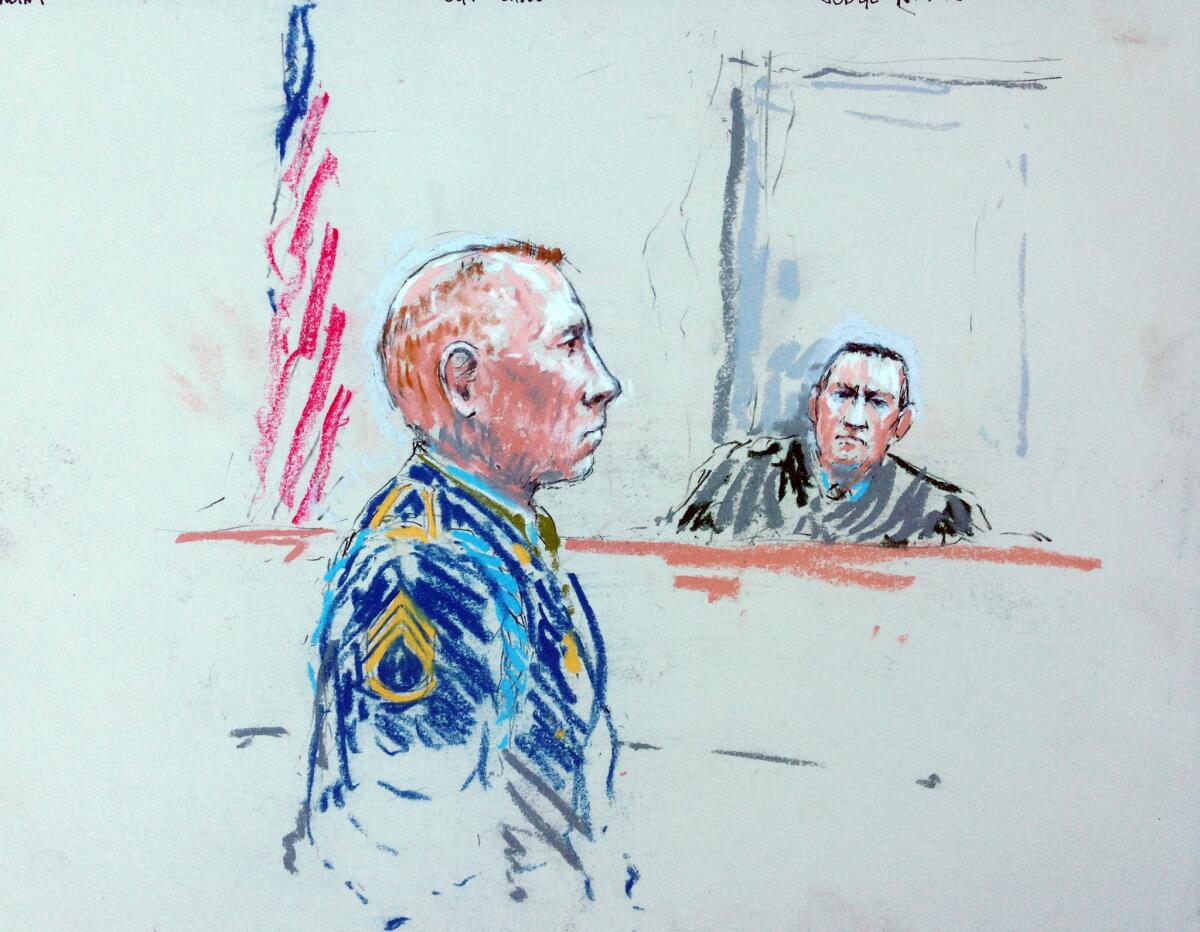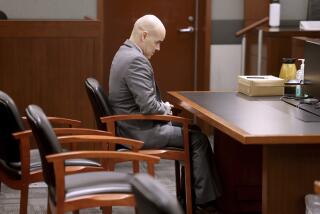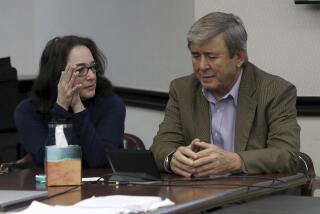Robert Bales’ sentencing: Defense introduces jury to ‘Bobby’

JOINT BASE LEWIS-McCHORD, Wash. -- A stream of prosecution witnesses spoke Wednesday of families torn apart, of children left with physical and emotional scars and of lasting damage to the military’s relationship with Afghan civilians because of the rampage U.S. Army Staff Sgt. Robert Bales pleaded guilty to perpetrating.
But as the sentencing hearing continued, defense attorney John Henry Browne wanted to simply introduce the jury to “Bobby.”
Bales’ brother and a longtime family friend talked about “Good Time Bobby,” the fun-loving guy from a blue-collar family in Norwood, Ohio. The captain of the football team and a class president in high school. The kind teenage neighbor who tended to the profoundly disabled boy next door. The dad who made chocolate-chip pancakes for his sons.
Jurors in the case will decide whether Bales should be sentenced to spend the rest of his life in prison or should be eligible for parole. After court adjourned for the day, Browne told reporters that he sought the jury’s compassion in weighing that choice.
Bales pleaded guilty in June to killing 16 Afghan civilians and injuring many others in a March 2012 rampage through two villages.
“I don’t think a rational mind could say Bob Bales’ mind didn’t snap,” Browne said.
He said the defense’s case would be centered on that argument: A man, strong in character and with good intentions, mentally broken by four tours at war. “You live in hell,” he said of soldiers’ experience in Afghanistan. “Can you imagine picking up body parts and putting them in bags?”
Browne, noting that a military court allowed an accused person to offer testimony in the sentencing phase without being cross-examined, said Bales would testify.
But it was clear on Wednesday that the defense wanted to humanize the man who had been portrayed by prosecutors as the culprit behind an atrocity.
Bales’ oldest brother, William, talked about a childhood in small-town Ohio, how their father had struggles with alcohol but worked hard to care for the family, and how their mother was a “saint.”
“Bobby was a good high school football player, even though his size wasn’t as big as some of the other boys,” William Bales, 55, said. “He could run; he could hit. He lacked the speed that could have taken him all the way, but he was a team guy.”
Bales’ childhood next-door neighbor, Bob Durham, cried as he recalled the care Bales showed for his disabled son, Wade, who is close to Bales in age. Durham said his son had severe brain damage brought on by a virus when he was a newborn.
“He can’t walk by himself; he can’t talk; he can’t fix his food. He can’t go to the bathroom by himself,” said Durham, who raised Wade as a single father. “I needed somebody to help me. I needed to know that he was safe. Bobby was extremely good at that.”
Earlier Wednesday, the prosecution focused on the lingering effects of the predawn attacks, not just for the people who saw their family members slaughtered and burned but also for their country.
Among the Afghans who testified, two of them felt stifled by the question-and-answer procedure. They wanted to speak freely. “There are things in my heart that I’d like to say,” said Haji Wasir, who lost several family members in the attack.
Also testifying was Col. Todd Wood, a brigade commander in Afghanistan, who said that immediately after the attack, he went to Bales’ base, where armed demonstrators had gathered. Family members of those killed showed Wood the bodies, charred and mutilated, that had been wrapped and loaded into the back of trucks.
For about two weeks, Wood said, coalition forces avoided the villages where the attacks took place. As a result, opposition forces came in and installed multiple improvised explosive devices, he said.
Wood said the victims and their families were paid, in total, about $980,000 in “condolence payments,” at which point the military moved in to search for evidence at the crime scenes and to remove the explosives.
“They have very long memories,” Wood said of the Afghan civilians, with whom the military has long worked to forge relationships. “They don’t forget an incident as significant as this, and they never will. It will take several generations before we win some of that trust back.”
[For the record, 5:43 p.m. Aug. 21: An earlier version of this post referred to the prosecution’s “closing arguments.” Actually, the prosecution finished its case in the sentencing phase.]
ALSO:
Ft. Hood shooter rests defense; doesn’t testify or call witnesses
Vegas carjacking: Bodies of CHP officer, brother-in-law heading home
WikiLeaks trial: Bradley Manning shows no reaction to prison sentence
Twitter: @rar
More to Read
Sign up for Essential California
The most important California stories and recommendations in your inbox every morning.
You may occasionally receive promotional content from the Los Angeles Times.









